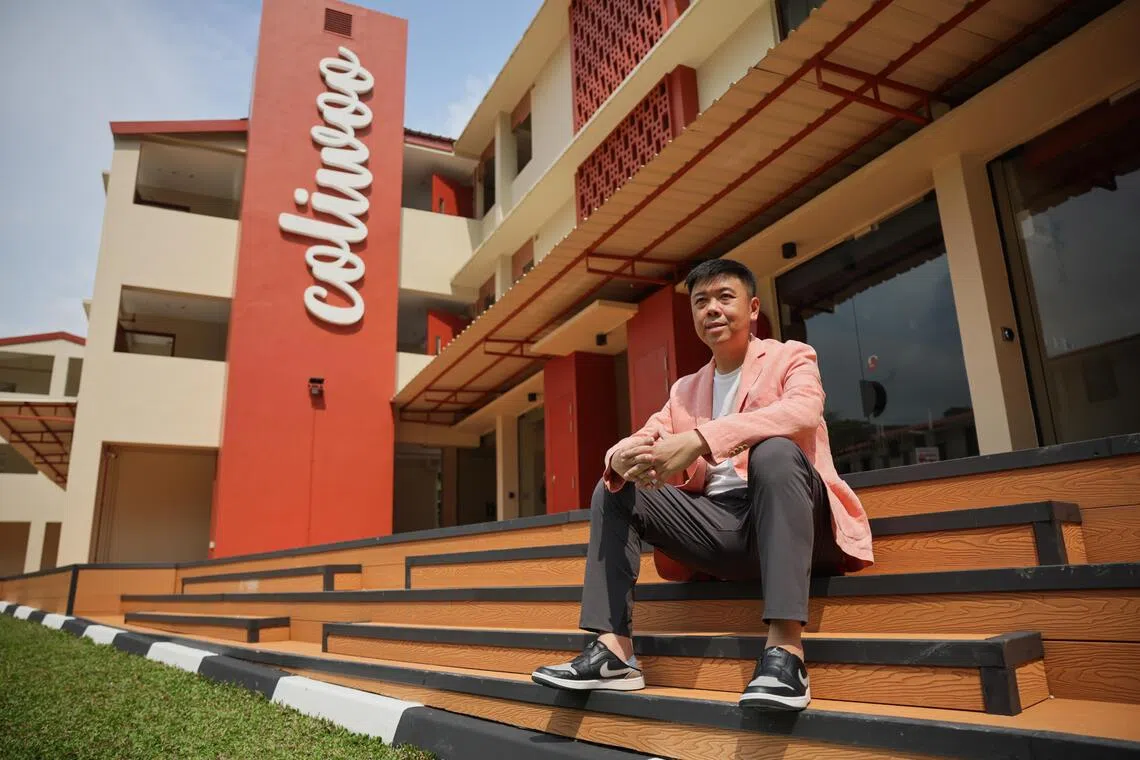Co-living operator Coliwoo eyes $48.2m IPO on SGX mainboard
Sign up now: Get ST's newsletters delivered to your inbox

Coliwoo is targeting to operate around 4,000 rooms by 2026, said founder Kelvin Lim.
ST PHOTO: GIN TAY
- Coliwoo plans to raise $48.2 million through an IPO on the SGX mainboard, offering shares at 60 cents each, with trading expected to begin on November 6.
- LHN is spinning off Coliwoo to improve resource allocation, aiming for Coliwoo to expand to 10,000 rooms by 2030, exploring markets like Malaysia and Hong Kong.
- Coliwoo differentiates itself via long master leases and property ownership, offering fully furnished rooms and flexible stay options, targeting a 40 per cent profit distribution post-listing in FY2025 and FY2026.
AI generated
SINGAPORE - Co-living operator Coliwoo is looking to raise $48.2 million through an initial public offering (IPO) on the Singapore Exchange (SGX) mainboard.
The offer of 80.3 million shares at 60 cents apiece comprises 75 million placement shares and 5.3 million public offer shares. In total, Coliwoo is looking to raise net proceeds of some $96.2 million from the IPO and the issuance of cornerstone shares.
The IPO opens on Oct 29 at 9am and will close at noon on Nov 4. Shares are expected to begin trading on Nov 6 at 9am.
Maybank Securities is the issue manager and global coordinator for the IPO. It is also joint bookrunner and underwriter, along with DBS Bank and RHB Bank.
Coliwoo expects to hit a market capitalisation of $288.5 million after listing, according to its final prospectus filed on Oct 28. The co-living business is being hived off from LHN Group as a separate listing.
Coliwoo’s founder Kelvin Lim, who is also the executive chairman and group managing director of LHN, told The Straits Times the main reason for spinning off Coliwoo is to improve the allocation of resources within the group.
LHN is a mainboard-listed real estate management company that rents out industrial and office space, manages commercial buildings and carparks, and installs solar panels and electric vehicle charging stations.
“We run multiple businesses under LHN, and a lot of financial resources have been allocated to Coliwoo. As a result, the other businesses are not growing as fast as we would like,” Mr Lim said.
The IPO would allow Coliwoo to raise funds for growth and enable LHN’s other businesses to be self-sustaining, he added.
Coliwoo’s IPO will also be the second time the group has spun off one of its businesses as a separate listing. It had listed its logistics arm, LHN Logistics, on the Catalist board in April 2022. That company was ultimately acquired by China’s Milkyway Chemical in 2023.
LHN will also delist from the Stock Exchange of Hong Kong
The last day of its trading in Hong Kong is expected to be Oct 30, and the company will delist on Nov 4 when the market closes at 4pm.
In 2025, the LHN counter rose by more than 120 per cent, hitting a new record high of $1.05 on Sept 12, after trading mostly flat since 2021. On Oct 28, it closed at 84.5 cents.
Founded in 2019, Coliwoo has a portfolio of 25 properties across Singapore, including serviced apartments, shophouse units and hotels. There are about 3,000 rooms, with over 2,100 under direct management and the rest managed by third parties.
This comes to about 19.5 per cent of the total market in Singapore, it said. Across all its properties, it maintained an average occupancy rate of over 95 per cent in the first half of 2025.
Net proceeds of $40 million will be used primarily for acquiring more master leases on properties in Singapore and new markets, as well as enhancement of existing assets; while $34 million will be channelled to potential joint ventures and acquisitions.
Its new mixed-development property at the old Bukit Timah fire station has already reached over 90 per cent room occupancy in its soft opening phase, with commercial tenants starting to move in. It expects to open its next property, a 212-room serviced apartment building in Bugis, by January 2026.
There are “four or five more” developments in the pipeline, according to Mr Lim.
Coliwoo aims to grow its portfolio by at least 800 rooms a year, with approximately 4,000 rooms by 2026. Malaysia and Hong Kong were cited as potential markets for overseas expansion, according to LHN’s circular on its plan to spin off Coliwoo filed on Aug 21.
Mr Lim added that the company also intends to upgrade its technologies, including its existing app, so that it can reduce reliance on manpower to manage properties.
For the first half of the financial year ended March 31, Coliwoo recorded $23.1 million in revenue, up 16.3 per cent from a year ago, and $9.3 million in net profit, up 15.6 per cent. Post-listing, the company plans to distribute no less than 40 per cent of profits to its shareholders for two years.
The co-living sector in Singapore has grown substantially since the pandemic due to higher property prices, interest rates and rents. These factors have driven demand for more affordable housing options, especially among expatriates and foreign students.
According to a September report by real estate company Jones Lang LaSalle (JLL), the number of rooms operated by co-living firms has grown by some 17 per cent between 2023 and 2025.
There are reportedly around 20 co-living operators here and according to JLL, the top five companies, which include Coliwoo, have a market share of 65.3 per cent.
Mr Lim said that Coliwoo’s business model is different from its competitors, allowing it to carve out a niche in the crowded and land-scarce Singapore market.
While other co-living operators may opt to sign master leases for individual condominium units and then sub-lease the rooms to tenants, Mr Lim said this model offers a very low margin.
Instead, Coliwoo signs long-term master leases for entire properties or purchases them when such leases are not suitable.
According to Mr Lim, about 70 per cent of Coliwoo’s rooms are signed under master leases, with the remaining 30 per cent directly owned.
The company intends to sell and lease back the properties that it currently owns, he said, and will strive to maintain this portfolio ratio going forward to keep its business model sustainable.
By combining the co-living business with LHN’s expertise in space optimisation and facilities management, Coliwoo is able to spread out its costs and offer its rooms at a lower cost than other firms. This allows the company to achieve a better internal rate of return compared with its competitors, Mr Lim said.
It also partners with tertiary institutions to provide student accommodation.
On average, Coliwoo’s rooms go for between $2,500 and $4,000 a month.
He acknowledged that the co-living business faces an increasing risk from rising real estate prices, and competitors have the financial means to outbid his firm for properties and develop more sophisticated concepts.
But this would also come at a higher cost. “For instance, a larger property with lots of greenery will be much harder to upkeep because you cannot afford to have weeds growing everywhere, or mosquito and ant infestations,” said Mr Lim.
Coliwoo’s portfolio comprises mostly buildings situated on small plots of land that are easier and less costly to maintain. On average, each Coliwoo property takes about six months to reach optimal occupancy and achieve profitability, he said.
While its rooms may be smaller than other operators’, Coliwoo’s properties are designed to give tenants greater peace of mind, Mr Lim noted. Rooms come fully furnished, with utilities, internet and even cleaning provided – amenities that not many competitors offer, he said.
Long-term residents also do not need to pay rent while they are away for holiday for a month or longer. Instead, Coliwoo will keep their belongings in storage and offer these tenants a similar room subject to availability when they return.
“So maybe in a year, you probably only pay rent for 10 months – that is cheaper and more flexible, and you don’t have to worry about anything,” Mr Lim said.
Unlike most co-living operators, Coliwoo also offers a short-term stay option which increases the flexibility of its offerings to tenants. This allows the company to maintain occupancy when tenants vacate their rooms temporarily, as it would typically be difficult to find replacement tenants with the exact same rental periods.
Tenants can stay for a minimum of six nights at the operator’s serviced apartments, or just one night at either of its two hotels in Kampong Glam and Pasir Panjang. Mr Lim noted that his properties saw an increase in short-term stay bookings in the last few months, with travellers coming to Singapore to attend events, concerts and the F1 race.
With 10 years of experience running a listed company, Mr Lim believes the time is right to take the next step with Coliwoo’s IPO.
Coliwoo is the seventh home-grown company to get a listing on SGX in 2025 amid a revival in initial public offers earlier in the year.
The other new Singapore entrants on the mainboard include Info-Tech Systems, Soon Hock Enterprise and Centurion Accommodation Reit; while Vin’s Holdings, Lum Chang Creations and Dezign Format joined the Catalist board.
Correction note: In an earlier version of the story, we said that Coliwoo is targeting to operate 10,000 rooms by 2030. This has been corrected.



